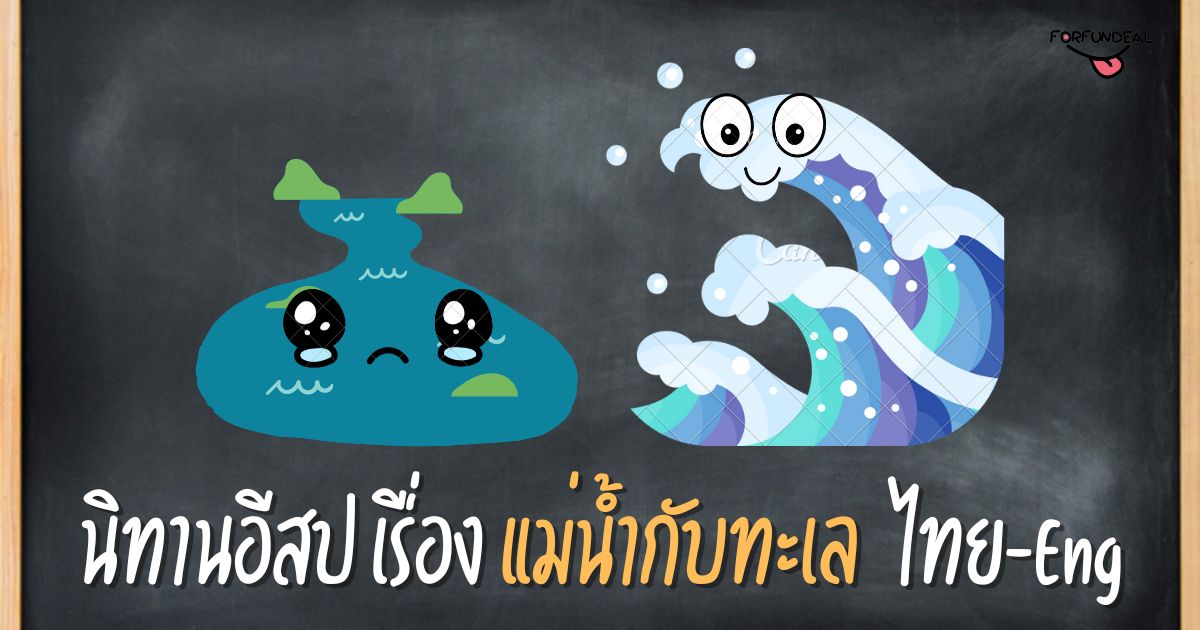“แม่น้ำกับทะเล” เป็นนิทานอีสปโดยแม่น้ำสายต่างๆ บ่นกับทะเลว่าน้ำเปลี่ยนเป็นเค็ม แต่ทะเลแนะนำให้พวกเขาเลือกเส้นทางอื่นหากต้องการหลีกเลี่ยงความเค็ม
นิทานอีสปเรื่องวัวและแม่น้ำกับทะเล
กาลครั้งหนึ่งนานมาแล้ว ท่ามกลางผืนดิน แม่น้ำไหลอย่างสง่างาม พัดพาน้ำใสและหวานผ่านหุบเขาและที่ราบ กระนั้น ขณะที่พวกสายน้ำเดินทาง พวกเขาบ่นกันเองเกี่ยวกับความคับข้องใจที่พวกเขาเผชิญต่อทะเลอันกว้างใหญ่ พวกเขาคร่ำครวญว่าน้ำบริสุทธิ์ของพวกเขากลายเป็นน้ำเค็มอย่างไม่อาจดื่มได้หลังจากปะปนกับน้ำในท้องทะเลอันกว้างใหญ่
Once upon a time, Amidst the land, rivers flowed gracefully, carrying their clear and sweet waters through valleys and plains. Yet, as they journeyed, they grumbled amongst themselves about a grievance they held against the vast sea. They lamented that their pure waters turned undrinkably salty after mingling with the sea’s expanse.
วันหนึ่งพวกเขาร่วมกันตัดสินใจแสดงความไม่พอใจต่อทะเล “เจ้าเปลี่ยนความหวานของเราให้เป็นความขม” พวกเขาบ่น “น้ำของเราเมื่อบริสุทธิ์แล้ว ก็แปดเปื้อนเพราะความเค็มของเจ้า”
One day, they collectively decided to express their discontent to the sea. “You transform our sweetness into bitterness,” they complained. “Our waters, once pure, become tainted by your saltiness.”
ทะเลรับฟังคำกล่าวหาของแม่น้ำอย่างใจเย็น แล้วตอบด้วยสติปัญญาว่า “ถ้าเจ้าทราบถึงผลที่ตามมา แล้วทำไมเจ้าไม่พยายามหลีกเลี่ยงผลที่ตามมาล่ะ? มันอยู่ในอำนาจของเจ้าที่จะเลือกเส้นทางอื่น”
The sea listened calmly to river complaints and then replied with wisdom, “If you are aware of the outcome, then why do you not seek to avoid such a consequence? It is within your power to choose a different path.”
แม่น้ำทั้งหลายได้ยินเสียงตอบรับของทะเลก็เงียบไป พวกเขาตระหนักว่าแม้ทะเลมีผลกระทบต่อน้ำของพวกเขาจริงๆ แต่พวกเขาก็ยังเลือกที่จะนำทางในลักษณะที่ลดการสัมผัสกับทะเลเค็มให้เหลือน้อยที่สุด
The rivers, hearing the sea’s response, fell silent. They realized that while the sea indeed had an impact on their waters, they also held the choice to navigate their course in a way that minimized their contact with the salty sea.

นิทานเรื่องนี้สอนให้รู้ว่า
“เช่นเดียวกับที่แม่น้ำควรเลือกเส้นทางอย่างชาญฉลาดเพื่อหลีกเลี่ยงการสูญเสียแก่นแท้ของแม่น้ำ เราก็จะต้องคำนึงถึงผลที่ตามมาจากการกระทำและการมีปฏิสัมพันธ์ของเราเช่นกัน”
- ความรับผิดชอบต่อผลลัพธ์: แม่น้ำต่างๆ บ่นเกี่ยวกับผลลัพธ์ของการเลือกของพวกเขาเอง เน้นย้ำถึงความสำคัญของการรับผิดชอบต่อผลที่ตามมาจากการกระทำของเรา
- การพิจารณาผลกระทบ: ก่อนที่จะวิพากษ์วิจารณ์หรือมีส่วนร่วมในการกระทำ จำเป็นต้องพิจารณาว่าสิ่งเหล่านี้อาจส่งผลกระทบต่อผู้อื่นและสถานการณ์โดยรวมอย่างไร
- การสื่อสารและการเอาใจใส่: แทนที่จะบ่นหลังจากข้อเท็จจริง การสื่อสารอย่างเปิดเผยและการเอาใจใส่สามารถป้องกันผลลัพธ์ที่ไม่พึงประสงค์และความเข้าใจผิดได้
- หลีกเลี่ยงความขัดแย้งที่ไม่จำเป็น: เรื่องราวทำหน้าที่เป็นเครื่องเตือนใจให้หลีกเลี่ยงสถานการณ์ที่อาจนำไปสู่ผลเสีย เหมือนกับแม่น้ำที่หลีกเลี่ยงการสัมผัสกับทะเล
- การวิพากษ์วิจารณ์อย่างมีสติ: การวิจารณ์ให้ชั้นเพิ่มเติม โดยเตือนการวิพากษ์วิจารณ์ที่ไม่เหมาะสมที่อาจทำร้ายหรือขัดขวางผู้อื่นโดยไม่ได้ตั้งใจ แม้ว่าเราจะตั้งใจช่วยเหลือก็ตาม
“Just as the rivers should have chosen their paths wisely to avoid losing their essence, we too must consider the consequences of our actions and interactions.”
- Responsibility for Outcomes: The rivers, by complaining about the outcome of their own choices, highlight the importance of taking responsibility for the consequences of our actions.
- Consideration of Impact: Before criticizing or engaging in actions, it’s essential to consider how they might impact others and the overall situation.
- Communication and Empathy: Instead of complaining after the fact, open communication and empathy can prevent unfavorable outcomes and misunderstandings.
- Avoid Unnecessary Conflict: The story serves as a reminder to avoid situations that might lead to negative consequences, much like the rivers avoiding contact with the sea.
- Mindful Criticism: The commentary provides an additional layer, cautioning against inappropriate criticism that might unintentionally harm or hinder someone, even if our intention is to help.
โดยสรุปแล้วนิทานเรื่องนี้เป็นเรื่องราวที่สนับสนุนให้เราเลือกอย่างมีสติ สื่อสารอย่างมีประสิทธิภาพ และเข้าถึงสถานการณ์ด้วยสติปัญญาและการเอาใจใส่ ซึ่งจะช่วยส่งเสริมการมีปฏิสัมพันธ์และผลลัพธ์เชิงบวก

